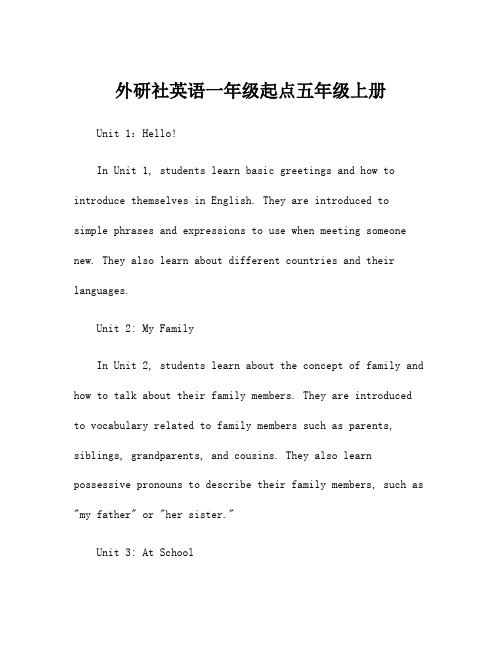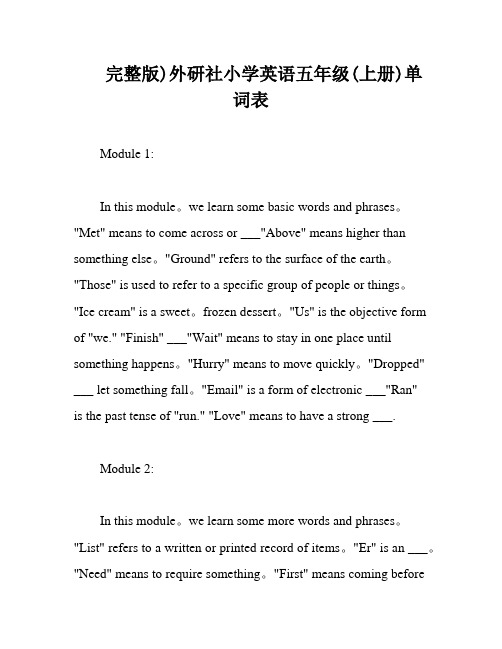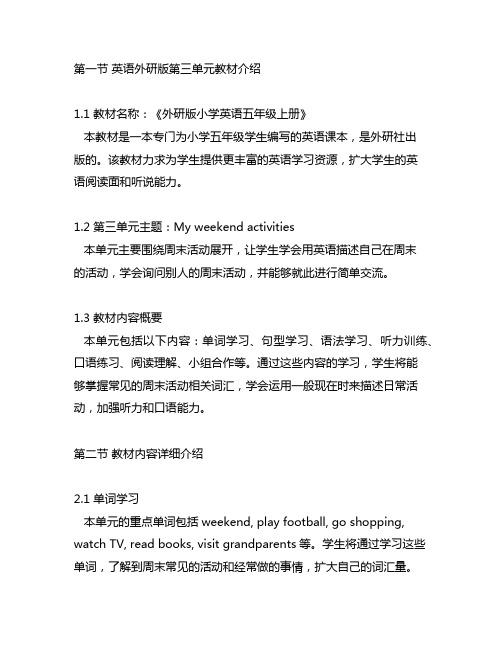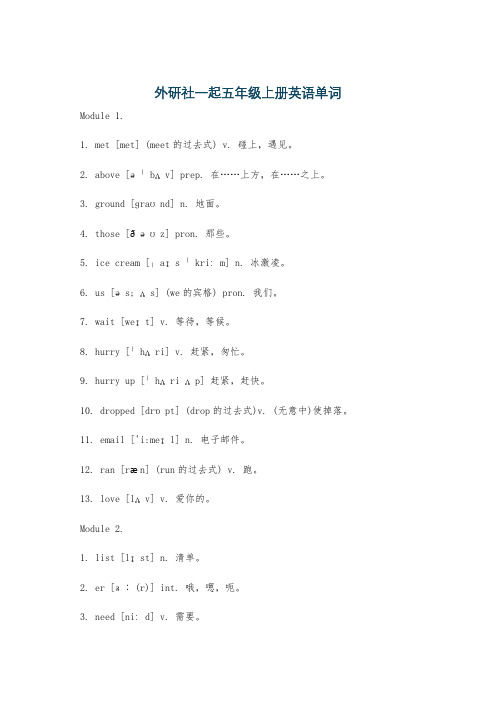外研社英语五年级上册
外研社英语(3起点)五年级上册知识点精华归纳

外研社英语(3起点)五年级上册知识点精华归纳外研社三起点五年级英语上册知识点归纳一、重点短语:1、eback回来2、lookatsb/stn3、waitforsb4、hurryupModule 1ebackfrom+某地看某人/某物等候某人赶快给某人打电从某地回来5、phonesb=callsb二、重点句型:1、--Did you e back yesterday?--No,we came back last Sunday.2、Let’sbuysome.<Let’s+动词原形让我们做······去吧.〕三、重点语法:一般过去时一般过去时〔动词+ed〕动词过去式〔动词+ed〕规如此:1〕、间接加-ed比方:looked,played2〕、去e加-ed比方:moved3〕、变y为i加-ed比方:carry-carried4〕、双写加-ed比如:planned5〕、不规如此变化比如:run-ran,swim-swam一般过去时句型结构:.肯定句:主语+动词过去式.否认句:主语+didn’t<did not>+动词原形.一般疑问句:Did+主语+动词原形?Yes,主语+did./No,主语+didn’t.Module 21、重点单词、短语:1、buy some fruit买一些生果2、make a shopping list制定一个购物清单3、also也,放句中.too也,放句末4、half a kilo半公斤5、a lot of=lots of许多接可数名词复数或不可数名词二、重点句型:1、--What did you buy?--I bought some apples.2、--How many bananas did you buy?--We didn’t buy any bananas.注:How many +可数名词复数+一般疑问句?3、--How much cheese did you buy?--Half a kilo.注:How much +不可数名词+一般疑问句?回答用half a kilo /数词+kilo<s> /数词+bottle<s>.3、重点语法:非凡疑问句1.特殊疑问句构成:非凡疑问词+普通疑问句?回答时,根据具体情况回答.2.非凡疑问词:what甚么、who谁、whose谁的、why为甚么、how如何where、那里When甚么时分Module 31、重点短语:1、at the weekend在周末2、visit lots of places参观许多地方3、take a boat trip坐船旅行4、have a good day渡过舒畅的一天给或人/某物照相5、take a photo of sb/sth3、重点句型:1、--Where did you go?--We went to the British Museum.2、--How did you go to these places?--We went by bus.3、What did you do at the weekend?.4、They arrived there at ten o’clock.Module 4一、重点短语:1、buy sth for sb=buysbsth给某人买某物my我的our我们的2、a pair of+复数一双your你的your你们的a pair of shoes/socks一双鞋/一双袜子his他的her她的its 它的their他们的a pair of shorts一条短裤Module 53、want to do想要做某事一、重点短语:二、重点句型:1、giveout分发--What’s the matter?--I lost my cap.What’s the matter<with sb>?3、重点语法:物主代词物主代词:透露表现"或人的〞,背面跟名词. .2、allright好的在你班上3、inyourclass4、somany+可数名词复数如此多....2、重点句型:1、How many faces can you see?2、There are only nineteen crayons.3、--How many pupils are there in your class? --There are fourteen.三、重点语法:There be句型There be句型:表示"某地有某...〞.常用结构:There is/are+某人/某物+地点.There is+a/an+可数名词单数+地点.There is+a/an+不可数名词+地点.There are+可数名词复数〔+s/es>+地址.Module 6一、重点短语:1、runfast跑得快跑得真快,跑得很快传球传得好踢球踢得好runreally/very fast2、pass theballwell3、playfootball well4、jump high跳高.jumpreally/veryhigh5、begoodat擅跳得真高,跳得很高长二、重点句型:1、--Can you pass the ball well?--Not very well.2、You are very good at basketball.=You can play footballwell.三、重点语法:情态动词cancan"能,能够,可以,会〞,后面跟动词原形肯定句:主语+can+动词原形.否认句:主语+can’t+动词原形.<can后加not,其余不变〕一般疑问句:Can+主语+动词原形?<can提前,其余不变〕Yes,主语+can.No,主语+can’t.Module 7一、重点短语:1、help a lot匡助很大2、help sb帮某人3、a TV showaboutdogs二、重点句子:1、This man is can’t see.2、--Can we have a dog?--No,we can’t.一个关于狗的电视节目.3、重点语法代词宾格:透露表现或人,作宾语用.me我you你him他her她it它us我们you你们them他们Module 8一、重点短语:1、what time is it?几点了?2、be late for school上学迟到3、at half past seven在七点半4、do exercise做操do morning exercises做早操5、want to do想要做某事二、重点句型:1、--What time is it now?--It’s half past eight.--What time is it now?--It’s +工夫点.2、--What time do you get up?.--I get up at half past seven.3、She always wants to walk.三、重点语法:一般现在时一般现在时:表示经常发生的动作或目前的状况.第三人称单数做主语,动词词尾加"s〞动词词尾加"s〞规如此:1〕间接加"S〞2〕以o、s、x、sh、ch结尾,加es3〕"子音字母+y末端〞,变y为i加es一定句:主语<三单〕+动词〔+s/es〕+别的.承认句:主语<三单〕+doesn’t+动词真相+别的.〔句中加doesn’t,动词复原,别的稳定〕一般疑问句式结构:Does+主语+动词真相+别的?〔句首加does,动词复原,别的稳定〕Yes,主语+ does./ No,主语+ doesn’t.其它人称做主语,动词用原形一定句:主语+动词+别的.否认句:主语+don’t+动词原形+其它.〔句中加don’t,其余不变〕一般疑问句:Do+主语+动词原形+其它?〔句首加do,其余不变〕.Yes,主语do./ No,主语don’t.Module 9一、重点短语:1、feelbored〔无聊〕/angry〔生气〕/sad〔难过〕/happy 〔高兴〕/tired〔疲倦〕/hungry〔饥饿〕2、feel cool〔凉爽〕/warm〔和煦〕/cold〔冰冷〕/hot 〔热〕3、be ill in hospital抱病住院4、call sb =phone sb给某人打二、重点句型:1、What’s the matter?What’s the matter with sb?2、--Are you feeling bored?--No./Yes.3、表达感触感染:Sb+be<am/is/are>+feeling+表感触感染的词.Sb+be<am/is/are>+表感触感染的词.Sb+feel/feels+表感触感染的词.Module 101、重点短语:1、inthekitchen在厨房里2、playhide-and-seek玩捉迷藏游戏.4、onthegrass5、climbthetree在草地上爬树二、重点句型:1、--Where is Sam?--He is in the bedroom.Sb+be<am/is/are/was/were>+地址.或人在某地2、--Where did you find John?--I found John in the kitchen.I found+某人/某物+地点.3、Don’t climb the tree.Don’t+动词真相.4、You can watch TV.不要... ...我在某地发现某人/某物.。
外研社五年级英语上册知识点总结

外研社五年级英语上册知识点总结外研社五年级英语上册是小学五年级上学期的英语教材,是学生正式接触语法知识的一本教材。
该教材针对小学生的认知特点和语言习得规律,选用认知活跃、有针对性和实用性强的话题,科学有序地呈现语言知识和技能,有助于学生逐步形成英语学习的习惯和自学能力,为小学阶段培养优秀的英语学习者打下坚实的基础。
本文将把外研社五年级英语上册的语法知识、词汇和听力重点进行概括总结,希望能对学生在学习该教材时有所帮助。
语法知识1.一般现在时和现在进行时•用法:表示经常性的动作和习惯(一般现在时),以及现在正在进行的动作(现在进行时)。
•结构:一般现在时的肯定句式为主语 + 动词原形;现在进行时的肯定句式为主语 + am/is/are + 动词 -ing 形式。
2.祈使句•用法:用于询问、指示、劝告、鼓励等交际意图。
•结构:祈使句只有在肯定句形式下,没有主语,动词原形直接作为句子的谓语。
如:Sit down. Look at me. Take care.3.特殊疑问句•用法:用于询问特定信息的句子。
•结构:由疑问词(如:what, where, when, who, why, which, how等)+ 动词+主语构成。
如:What do you like? Where is your school? Who are they?How are you today?4.情态动词•用法:表示说话人的态度、情感、意愿、推测等。
•常用的情态动词有can, could, may, might, shall, should, will, would, must, ought to等。
5.一般过去时•用法:表示过去发生的动作。
•结构:一般过去时的肯定句式为主语 + 动词过去式。
如:I went to Beijing last week. She played the piano when she was young.词汇1.动词根据动词的时态、语态、情态以及不同的动作主语,文章用到的动词有以下几类:•一般现在时动词(如:like, eat, drink等)•现在进行时动词(如:reading, playing, eating等)•一般过去时动词(如:went, saw, played等)•情态动词(如:can, could, may, might, will, would, must, should, have to等)•不规则动词(如:be, do, have, go等)2.名词•能力(如:ability, skill)•食品与饮料(如:food, drink)•身体部位(如:head, foot, arm, leg, eye, ear等)•动物(如:pet, rabbit, bird, turtle, panda, lion等)•学校(如:school, classroom, teacher, student, desk等)•时间(如:morning, afternoon, night等)3.形容词和副词•描述性的形容词(如:big, small, tall, short, long等)•表示感受和程度的形容词(如:happy, sad, excited, scared, tired等)•表示时间、地点、方式等副词(如:now, here, there, well, fast, slowly等)听力重点1.听懂人们之间的问候、介绍和谈话等基本交际用语。
外研社英语一年级起点五年级上册

外研社英语一年级起点五年级上册Unit 1:Hello!In Unit 1, students learn basic greetings and how to introduce themselves in English. They are introduced to simple phrases and expressions to use when meeting someone new. They also learn about different countries and their languages.Unit 2: My FamilyIn Unit 2, students learn about the concept of family and how to talk about their family members. They are introduced to vocabulary related to family members such as parents, siblings, grandparents, and cousins. They also learn possessive pronouns to describe their family members, such as "my father" or "her sister."Unit 3: At SchoolIn Unit 3, students learn about school-related vocabulary and basic classroom instructions. They learn how to say and write the names of school subjects, such as math, science, and English. They also learn about common school supplieslike pencils, pens, and notebooks.Unit 4: My DayIn Unit 4, students learn how to talk about their daily routines and activities. They learn how to express the time using simple phrases like "in the morning" or "in the afternoon." They also learn about different activities such as brushing teeth, eating breakfast, going to school, and playing sports.Unit 5: My HomeIn Unit 5, students learn how to describe their homes and the rooms inside. They learn vocabulary related to different rooms in the house, such as bedroom, living room, kitchen,and bathroom. They also learn how to describe the furniture and objects inside each room.Unit 6: Food and DrinkIn Unit 6, students learn vocabulary related to food and drink. They learn names of different types of food such as fruits, vegetables, meat, and desserts. They also learn how to express their likes and dislikes for different foods.Unit 7: AnimalsIn Unit 7, students learn vocabulary related to different animals. They learn names of common animals such as cat, dog, bird, and fish. They also learn adjectives to describe the animals, such as big, small, fast, or slow.Unit 8: Colors and ShapesIn Unit 8, students learn about different colors and shapes. They learn names of colors such as red, blue, and green. They also learn names of shapes like circle, square,and triangle. They learn how to describe objects using colors and shapes.Unit 9: WeatherIn Unit 9, students learn vocabulary related to different types of weather. They learn names of weather conditions such as sunny, rainy, cloudy, and windy. They also learn how to describe the weather in different seasons.。
完整版)外研社小学英语五年级(上册)单词表

完整版)外研社小学英语五年级(上册)单词表Module 1:In this module。
we learn some basic words and phrases。
"Met" means to come across or ___"Above" means higher than something else。
"Ground" refers to the surface of the earth。
"Those" is used to refer to a specific group of people or things。
"Ice cream" is a sweet。
frozen dessert。
"Us" is the objective form of "we." "Finish" ___"Wait" means to stay in one place until something happens。
"Hurry" means to move quickly。
"Dropped" ___ let something fall。
"Email" is a form of electronic ___"Ran"is the past tense of "run." "Love" means to have a strong ___.Module 2:In this module。
we learn some more words and phrases。
"List" refers to a written or printed record of items。
外研社英语一起点五年级上册教案

外研社英语一起点五年级上册教案英语老师要在课堂中要为学生们创设仿真的生活场景,让他们体验情景中使用的语言。
写一篇优秀的五年级英语教案对五年级英语老师的教学工作有着许多帮助,你会写五年级英语教案?你是否在找正准备撰写“外研社英语一起点五年级上册教案”,下面收集了相关的素材,供大家写文参考!外研社英语一起点五年级上册教案1教学内容分析:第九模块主要话题是”Letters from Abord.”谈论大明收到两封国外来信。
我所设计的这一课时,主要围绕大明收到一封来自英国的信件展开学习。
在信中主要描述Amy , Sam, Lingling 去英国剧院看表演的经过,以过去时态为主。
该单元是本册中一般过去时态的集中体现,也是对前面学过的一般过去时态的再次呈现,不但复习、巩固了旧知识,同时也提高语言综合运用能力。
此外通过本单元的学习,学生能更多的了解西方国家的文化。
学生学习情况分析:由于学生已经在第四册、第五册陆续学习了一般过去时态,因此学生对本课要学习的知识点并不陌生,而且本课讲述的内容比较有趣,学生学起来兴趣还是蛮高的。
但由于汉语没有动词时态上的变化,学生要掌握好过去时态,特别是不规则动词的过去式有一定难度。
设计理念:1、以兴趣为导向,开展丰富教学活动众所周知“兴趣是的老师”,只有开展丰富多彩的教学活动,才能寓教于乐,激发学生的学习兴趣,变学生的被动学习为主动学习。
因此课伊始的我设计了I say, You say 活动课前热身;课中创设各种不同情景,让学生在仿真实的情景中学习;课尾声我设计了给老师发E-mail活动。
学生学习热情高涨,课堂气氛活跃,课堂充满乐趣,从而激发了学生学习英语的兴趣。
2、充分运用多媒体课件,让学生在仿真实的情景中体验、感知。
《英语课程标准》提倡教师要充分利用现代教育技术,开发英语学习资源,提高教学效果。
因此,在设计本课的教学时,为了让学生更好地理解课文,我根据教学实际制作了画面生动、图文并茂的课件,让学生通过直观的感知、体验,更好地理解课文,并且留下深刻的印象。
五年级上册英语外研版第三单元

第一节英语外研版第三单元教材介绍1.1 教材名称:《外研版小学英语五年级上册》本教材是一本专门为小学五年级学生编写的英语课本,是外研社出版的。
该教材力求为学生提供更丰富的英语学习资源,扩大学生的英语阅读面和听说能力。
1.2 第三单元主题:My weekend activities本单元主要围绕周末活动展开,让学生学会用英语描述自己在周末的活动,学会询问别人的周末活动,并能够就此进行简单交流。
1.3 教材内容概要本单元包括以下内容:单词学习、句型学习、语法学习、听力训练、口语练习、阅读理解、小组合作等。
通过这些内容的学习,学生将能够掌握常见的周末活动相关词汇,学会运用一般现在时来描述日常活动,加强听力和口语能力。
第二节教材内容详细介绍2.1 单词学习本单元的重点单词包括weekend, play football, go shopping, watch TV, read books, visit grandparents等。
学生将通过学习这些单词,了解到周末常见的活动和经常做的事情,扩大自己的词汇量。
2.2 句型学习本单元的句型学习主要围绕一般现在时进行,学生将通过学习一般现在时的肯定句、否定句和疑问句,掌握描述周末活动的基本句型,能够用英语描述自己的周末活动。
2.3 语法学习本单元的语法学习主要包括一般现在时的构成和用法。
学生将通过练习,掌握动词第三人称单数的变化规则,理解动词do/does的用法,并能够正确运用一般现在时来描述自己的活动。
2.4 听力训练本单元的听力训练主要包括听懂并模仿简单的周末活动的描述,学生将通过听力训练,提高自己的听力理解能力,能够听懂简单的周末活动描述并进行模仿。
2.5 口语练习本单元的口语练习主要包括学生之间的口语交流和小组合作。
学生将通过与同学进行口语练习,培养自己的口语表达能力,能够用英语描述自己的周末活动,并与同学进行简单交流。
2.6 阅读理解本单元的阅读理解主要包括周末活动的描述和阅读理解题目,学生将通过阅读短文了解不同人的周末活动,并能够根据所读内容回答相关问题。
外研社一起五年级上册英语单词

外研社一起五年级上册英语单词Module 1.1. met [met] (meet的过去式) v. 碰上,遇见。
2. above [əˈbʌv] prep. 在……上方,在……之上。
3. ground [ɡraʊnd] n. 地面。
4. those [ðəʊz] pron. 那些。
5. ice cream [ˌaɪs ˈkriːm] n. 冰激凌。
6. us [əs; ʌs] (we的宾格) pron. 我们。
7. wait [weɪt] v. 等待,等候。
8. hurry [ˈhʌri] v. 赶紧,匆忙。
9. hurry up [ˈhʌri ʌp] 赶紧,赶快。
10. dropped [drɒpt] (drop的过去式)v. (无意中)使掉落。
11. email ['i:meɪl] n. 电子邮件。
12. ran [ræn] (run的过去式) v. 跑。
13. love [lʌv] v. 爱你的。
Module 2.1. list [lɪst] n. 清单。
2. er [ɜː(r)] int. 哦,嗯,呃。
3. need [niːd] v. 需要。
4. first [fɜːst] adv. 第一;adj. 第一(的)5. can [kæn] v. aux. 可以。
6. lost [lɒst] (lose的过去式) v. 丢失。
7. how much [haʊ mʌtʃ] 多少(用于不可数名词)8. cheese [tʃiːz] n. 奶酪。
9. any ['eni] pron. 一些,一点,若干。
10. use [juːz] v. 使用。
11. over there [ˈəʊvə(r) ðeə(r)] 在那边。
12. bottle ['bɒtl] n. 瓶子;一瓶的容量。
13. half [hɑːf] 一半。
14. kilo ['kiːləʊ] n. 千克,公斤。
外研社五年级英语

外研社小学英语五年级上Module 1 Unit 1: There wasn't a pond.【课文】Lingling: You were in China for two years. Does London look different now? Amy: Yes, it does.Amy: This park is different. There weren't any swings here before.Sam: There was only a slide.Sam: Look, there's a pond. There wasn't a pond here before!Lingling: There is one now. There are ducks, too.Lingling: Do you like the park now?Amy: Yes, I do. We can feed the ducks.Sam: We couldn't before. There wasn't a pond!Lingling:Then let's go to feed the ducks.Amy and Sam: Great!【课文翻译】玲玲:你在中国呆了两年了,现在的伦敦跟以前有区别么?艾米:有啊。
艾米:这个公园和以前不一样了,以前这里没有这么多秋千的。
萨姆:这里以前只有一个滑梯。
萨姆:看,这里有个池塘,以前是没有的。
玲玲:现在有了啊。
而且里面还有鸭子呢。
玲玲:现在这个公园你喜欢吗?艾米:当然。
我们可以喂鸭子的。
萨姆:以前我们是不能喂鸭子的,因为这里以前没有池塘。
玲玲:那让我们去喂鸭子吧。
艾米和萨姆:太好了!【生词】year n.年before adv.以前duck n.鸭子playground n.操场【知识点】"There be"是英语中最常见的又是非常重要的句型,它是表示“存在” 的一种基本方式,其句型结构通常为:There be + sb./sth. + somewhere/doing sth.,请看下面的例句:1. There is a shop at the corner, where you can buy fruits.在拐角处有家商店,你可以在那里买水果。
- 1、下载文档前请自行甄别文档内容的完整性,平台不提供额外的编辑、内容补充、找答案等附加服务。
- 2、"仅部分预览"的文档,不可在线预览部分如存在完整性等问题,可反馈申请退款(可完整预览的文档不适用该条件!)。
- 3、如文档侵犯您的权益,请联系客服反馈,我们会尽快为您处理(人工客服工作时间:9:00-18:30)。
• • • •
句型: 一. 疑问词(放在句首) when什么时候 where在哪里 who谁 what什么 how怎样,如何 二. (用什么提问,用什么回答)(疑问句直接回答)
– Did you walk to school? (你步行去学校么?)Yes, I did. No, I didn’t – .Did they go home by bike?(他们骑自行车去学校么?) Yes, they did. No, they didn’t. – When did you come back with Sam?(你和sam什么时候回来?)
• • • • • •
I came back with Sam yesterday.(昨天我和sam回来的。) 4. I dropped my ice cream. 三、with 加某人放在后面。如:I went to school with Sam.(我同sam去学校) 四、过去式:come-came go-went meet-met buy-bought drop-dropped Run-ran see-saw walk-walked send(邮寄)-sent eat-ate live-lived Have-had do-did
• 第五模块 短语 • give out 分发2.give to 给3.in the class 在班级里4.have got 有 • put……in 把……放进去6.in the blue box 在蓝色的盒子7.be careful 小 心8.too many book 太多的书9.enough pencils 足够的铅笔 10.every child 每个孩子 11.learn chinese学习汉语 12.twenty pencils20枝 铅笔13.in the bag在书包里 14.put on 穿上 • 句型:1. There are +数量+名词 表示名词有多少个 • 例: 有四个苹果There are four apples • 2.There are enough +名词。表示有足够多的东西来分配 • 例:有4个苹果,有三个学生 • There are four apples. There are three students. There are enough. • There are too many books on the desk.桌子上有太多的书。 • 4.There are too many +名词+地点。表示在……有太多的……。 • 例: 书包里有太多书。 There are too many books in the bag.
句型
• • • • • • 1. how many +可数名词+do you want? 你想要多少……呢? 对可数名词的数量提问。 例:How many bananas do you want? 2. how much +丌可数名词+ do you want? 对丌可数名词的数量进行提问 例:How many milk do you want?(常见的丌可数名词:milk juice water meat rice bread cake cheese ) • 3. do you like ……? 你喜欢……吗?例:Do you like cheese? • Yes, I do.No, I don’t.
第三模块
短语 1. at the weekend 在周末 2. lots of 许多3. the British Museum 大英博物馆 • 4. Big Ben 大本钟 5. the London Eye 伦敦眼 6. like ……best 最喜欢 10. at ten o’clock 在10点 11. take photos of 拍照12. by bus 乘坐公共汽车 • 13. the Great Wall 长城 14、in the morning在早上 • •
• 二. 短语 • 1. what’s the matter? 发生什么事了?2. on the line 在绳上 • 3、Don't argue丌要争吵
• 三. 语法点 • 1. Whose bag is this? • 这是谁的书包?Whose :谁的,后面直接跟名 词,询问时谁的东西。 • 2. lingling’s cap玲玲的帽子。人名’s +名词: 名 词所有格,表示是谁的东西。 • 例: Tom的书 Tom’s book Sam的包 Sam’s bag • A:sam took my T-shirt。He wants to wear it。 • B:but it isn’t hers。it’s mine • A:Is this Sam’s bag ? B: Yes it’s his
• 第八模块 短语 • 1.would like to do 想要干……2.what time 问事情 什么时间点发生3.at nine o’clock 在九点4.half past seven 七点半5. do exercises 做运动6.in the playground 在操场上7.skipping rope 跳绳 8.get up 起床9.sam and amy’s school sam 和amy的学校10.in England 在英国11.do morning exercises 做早操12.go into the classroom 进入教室
外研社小学英语 五年级上册复习 短语 句型
五年级复习提纲第一模块
• 短语: • 1. in London 在伦 2. be back from 从……回来 3. come back 回来 4. last Sunday 上星期天 5. live in住在 6. look at 看 7. ice cream 冰激凌 • 8. come with 不……一起来 9. hurry up 赶快10. wait for 等待 11. by bus 乘坐公交车12.chinese friends 中国朋友13.
• 第七模块短语 • 1.a programme about 关亍……的节目2.be useful 有用的 3.sit down 坐下 4.hot dogs 热狗 5.these firemen 这些 消防员6.sausag is blind. He can’t see. This dog helps him. • This girl is deaf. She can’t hear. This dog helps her. • These firemen can’t find people. These dogs help them. • 4.This little girl can’t walk。Her father helps her。 • 5.Thisold man can’t sit down。A young girl helps him。 • 6.These chick can’t eat。Their mother helps them。 • 7.This little girl can’t swim。Her monther helps her
• 句型1.时间的表达 在几点几分用at • (1).整点时间 数字+o’clock 例 7点 seven o’clock 在七点 at seven o’clock • 8点 eight o’clock 在8点 at eight o’clock • (2)半点表达 half past +数字 • 例: 7点半 half past seven 在7点半 at half past seven • 8点半 half past eight 在8点半 at half past eight • 2.A: What time does school start?学校几点开 始?B:My school starts at nine o’clock • 3.AWhat time do you get up?B:I get up at half past seven。
• 第六模块 短语 • 1.in the football team 在足球队2.play well 打得好 3.run fast 跑得快 4 catch the ball well接球接得好 5.control the ball 控球6.jump high 跳得高7.be good at 擅长干…… 8. in china 在中国9. a fantastic goalkeeper 一个出色的守门员 • 句型1. Can you run fast? 你能跑得快吗?Yes, I can. No, I can’t. • 2. You can catch the ball well.(你能接球接得 很好。) • You can control the ball well。(你能控球控得很 好。) • 3. You can play football well。(你能踢足球踢 得很好。)
• 第十模块短语: • 1. in the road 在路上2. be dangerous 危险 3. cross the road 穿过马路4. hold my hand 握住我 的手5. say hello to 给……说你好 6. in a hurry =hurry up 赶紧,匆忙7. take the right child 带走 正确的孩子8. do homework 做家庭作业9. ride bicycle 骑自行车10. play the flute 吹笛子11. eat fruit 吃水果
• 第九模块短语 • 1. what’s the matter? 发生什么事了? 2. miss china 想 念中国3. play chess 下象棋 • 4. of course not 当然5. think about 思考,考虑6. on the farm 在农场上7. all day 整天 8. go out 出去 9. go out to play 出去玩耍10. noodle soup 面条汤 • 句型:Are you feeling ……? 你觉得……吗?Yes, I am No, I’m not. • 表示一种情绪状态。表示情绪状态的词有:sad 难过 : bored 无聊 angry 生气: happy 高兴: tired 劳累: hungry 饥饿
